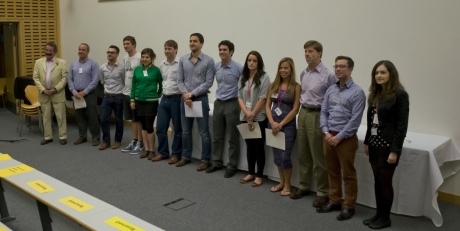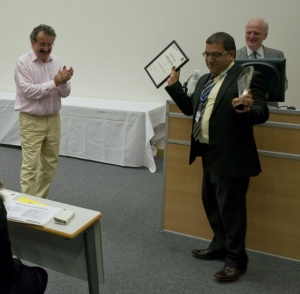Research students present best of Imperial science

This year's Graduate School Summer Research Symposium saw over 100 research students present their work as part of a poster competition.
A new method to scan the brains of unborn babies, a surgical robot controlled by gestures and a ‘magic’ theory of gravity – these were just a few fascinating research projects on display at the event.
Students were nominated by their respective departments to participate in the competition held at the Great Hall on Friday 12 July, where they gave a two minute ‘elevator pitch’ to three judges.

Student researchers who were nominated for awards in the poster competition
With scores awarded for content, visual impact, design and public engagement, Andrea Marongiu (National Heart & Lung Institute) emerged as the overall winner, presenting his plans to study the cardio-respiratory effects of arc welding in shipyards.
Andrea, a second year PhD student, said: “Being able to communicate science in a simple manner that’s accessible to all is easier said than done. If we get wrapped up in our own little world of research, we then run the risk of becoming alienated from the lives of those who we set out to help with our research in the first place."
Commenting on how audiences react to his research Andrea added: “I find it interesting that some people never thought much of welding and the health risks that might come with it, even though metal welding has wide applications in numerous industries and therefore is intrinsically part of our daily lives.”
If we get wrapped up in our own little world of research, we then run the risk of becoming alienated from the lives of those who we set out to help with our research in the first place
– Andrea Marongiu, PhD student
Poster competition overall winner
Giving out prizes for the winning and highly commended posters (see right), Director of the Graduate School, Professor Andrew George, mentioned that several of the judges had approached him independently and said how much they enjoyed the event and how they found out something new about the College.
“It’s not often we get this opportunity to look across the entire College at the breadth of research being carried out here,” Andrew said.
Professor George also presented The Graduate School Director’s Award for Professional Skills Training to Mr Ebrahim Mohammed from the Business School. This award recognises the outstanding contribution to and support for the Graduate School's professional skills training programme amongst Imperial academics and research staff.

Mr Ebrahim Mohammed (Business School) collects the Graduate School Director’s Award for Professional Skills Training
The day concluded with a key-note lecture by Professor Lord Winston, holder of the College’s first Chair in Science and Society, entitled ‘Why bother with science communication’.
In a wide ranging talk covering everything from human evolution to nuclear policy Lord Winston identified some of the dangers in misrepresenting science and the obligation scientists have to engage with the public.
“Imperial has a large number of scientists who are really good at communication and of course people who really understand their subject and act as wonderful role models. I think there is no doubt that one of the reasons why we are seeing more women in science is because we have female role models showing that actually it’s not impossible to do it,” Lord Winston said.
Article text (excluding photos or graphics) © Imperial College London.
Photos and graphics subject to third party copyright used with permission or © Imperial College London.
Reporter
Andrew Czyzewski
Communications Division